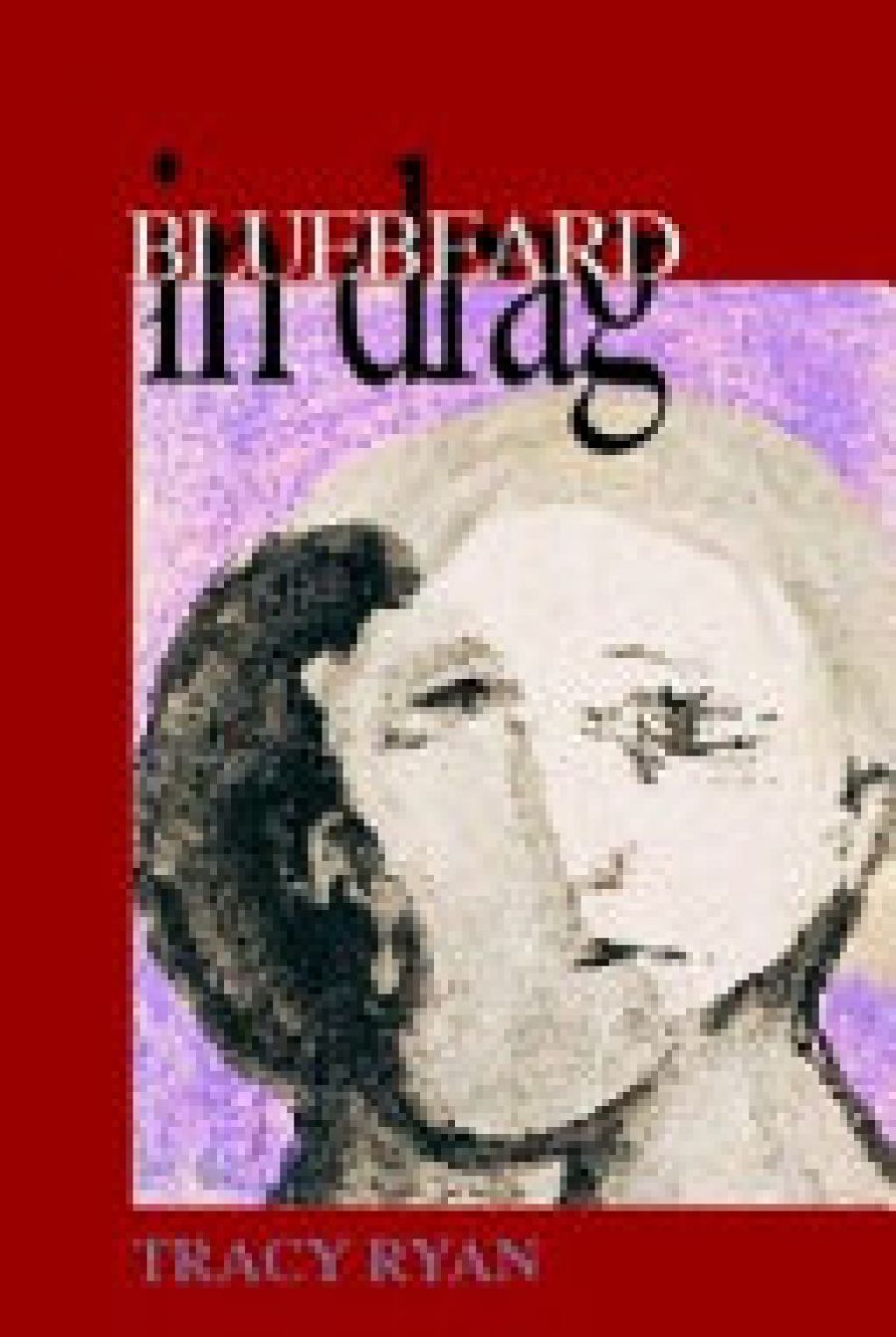
- Free Article: No
- Contents Category: Poetry
- Review Article: Yes
- Article Title: The Sorrows of Women
- Online Only: No
- Custom Highlight Text:
In Tracy Ryan’s poems there are no safe houses, the walls of domesticity keep falling in and she is the clear-eyed tightrope walker negotiating a perilous foothold. Her lines zigzag across the page:
- Book 1 Title: Bluebeard in Drag
- Book 1 Biblio: FACP $16.95 pb, 76 pp
How can I be daughter mother wife
I’ll shave
my head/collaborator
parade
our shame through streets
but the whole world
is Vichy.
‘Generations’
The power of these poems lies in their subject matter, their sharp imagery, their tense chopped off lines and their ferocious control. Bluebeard in Drag is Tracy Ryan’s second collection. The first used a combination of myth, fairytale, and the ordinary to mine the terror and the inexplicable in female experience. Bluebeard in Drag is a stronger, tougher and, I think, wiser book. She understands more and is prepared, without equivocation, to tread the minefield of family relationships.
The titles of her two collections are revealing. In both books there is a sense of the gothic, a darkness that must be confronted and overcome. Delilah is threatened with death but a female Bluebeard is a different proposition altogether. She carries her own implicit threat and the corpses in her house are her own. Here Cinderella, Jenny Craig, Jo March in Little Women, The Little Match Girl, Red Riding Hood, the grandmother and the wolf, with a bellyache from overeating, give this book an extraordinary taste of comic terror where anything might happen in stuffy rooms or around the next street corner.
Bluebeard in Drag uses as one of its epigraphs a quote from Alice Miller’s ‘Thou shalt not be Aware’:
The victimisation of children is nowhere forbidden; what is forbidden is to write about it
always the same
the weight
coming down
like hand over
mouth
the rent
the pain
so real
I can smell him
taste his
sweat
‘Even by Day’each scent
detached from
its parent
his beer breath
her sandalwood
perfume
child
drinks them in
like poison
can’t tell
who’s villain
who’s victim
‘Murder in the Dark’
The life of women is a life of secrets, of constant compromise. The moments are pinned down meticulously, snapshots caught at that point ‘between smile and rage’ – the child learning to knit, the girl ‘shelling the days neatly as peas that will never reach the table’, the Sheaffer pen signing away so much for ‘the men in suits’. When the poet leaves her psychiatrist’s rooms there is ‘a very small voice / it’s all that’s left of her’.
But parents, siblings, and lovers are never demonised. There are moments of tenderness, of compassion, an understanding of human weakness, that fallibility we all share.
I confess
I also loved you
does that jeopardise
my case
you sat me
on your knee, you
sang to me
passed on your fear like
a gift that had
cost you everything
at Mass you thrust me
under your arm like
a crutch
your grip crushed
my fingers
your whispers warm
with liquor, your pain
heavy as Jesus
‘Deposition’
The mother who could have sung like Piaf on street corners becomes the wife ‘whose cunt is never allowed to be sick’, the dead brother, unrepentant scientist, who took everything apart, dismembering her as well; the sister sitting in the window of fear in ‘the house where no light enters’, all these are remembered. When the poet at eighteen leaves this house she escapes like air.
‘Spring again, carn I stand it?’ writes Margaret Atwood. And Tracy Ryan replies: ‘madness how hands mouths tongues can / so quickly reach agreement / in spite of us.’
This is not just a book of woman as victim. It is the work of a sharp-eyed observer who gives no quarter. The cover of Bluebeard in Drag is the double image of a woman drawn by Joy Hester, another artist who also went to the edge and never compromised. Tracy Ryan, still a young woman, comes from a large Catholic family and grew up in the outer suburbs of Perth, a fine feeding ground I should imagine for poems like these. Sometimes she reminds me a little of Sylvia Plath. The last poem in the book uses as title one of Plath’s lines – ‘she has folded them back into her body’. Sometimes she reminds me a little of the strength and savagery of Gig Ryan, but mostly she is her own self, dancing with a language forged in talent and courage, working through the methodology of precise exploration.


Comments powered by CComment